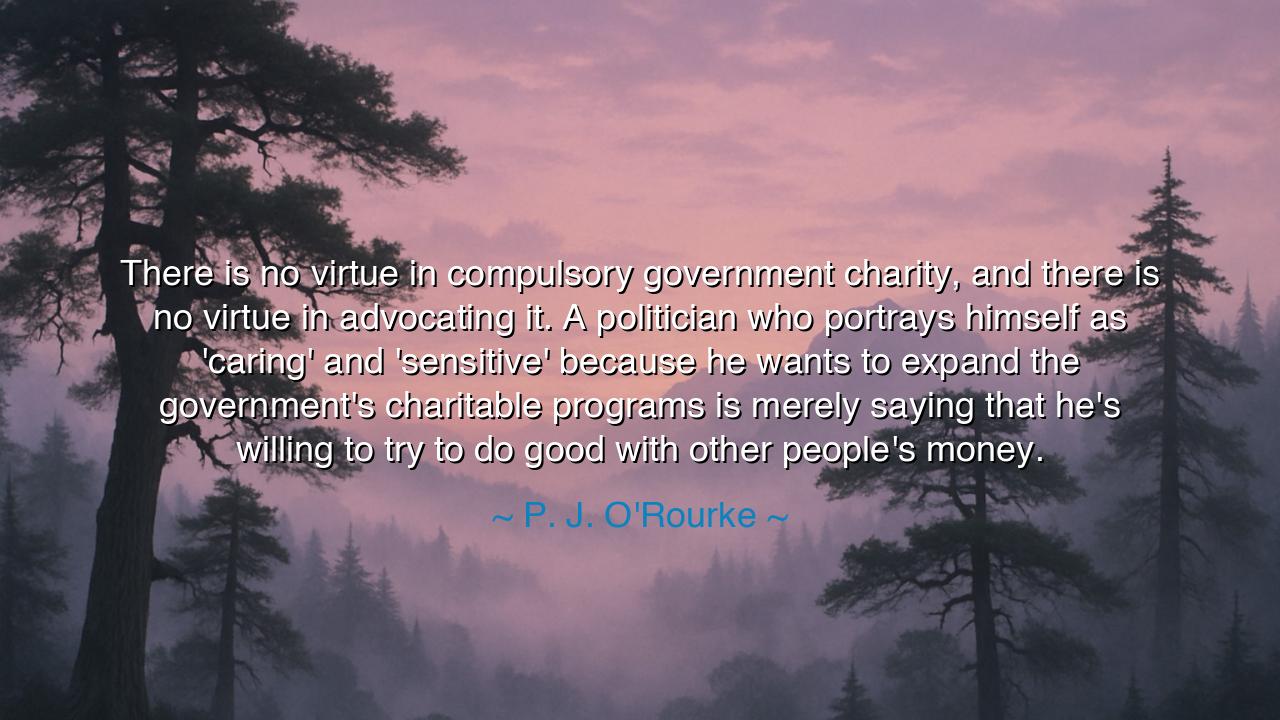
There is no virtue in compulsory government charity, and there is
There is no virtue in compulsory government charity, and there is no virtue in advocating it. A politician who portrays himself as 'caring' and 'sensitive' because he wants to expand the government's charitable programs is merely saying that he's willing to try to do good with other people's money.






The words of P. J. O’Rourke — “There is no virtue in compulsory government charity, and there is no virtue in advocating it. A politician who portrays himself as ‘caring’ and ‘sensitive’ because he wants to expand the government’s charitable programs is merely saying that he’s willing to try to do good with other people’s money.” — burn with the fire of ancient truth and moral discernment. They pierce through the comfortable illusions of false compassion, reminding us that virtue cannot be forced, nor can generosity be bought with the coins of others. True charity is born not of compulsion, but of freedom and conscience — the pure desire of the heart to lift another from despair. When kindness becomes the tool of politics, it loses its soul and becomes a mask for power.
O’Rourke’s words are a rebuke to the age-old temptation of rulers — to appear merciful without being truly generous, to buy praise with the wealth of others. In every era, there have been those who cloak ambition in the garments of compassion, who promise to heal society not by inspiring virtue but by legislating it. Yet, as the ancients knew well, virtue cannot be commanded; it must be chosen. A law may compel obedience, but it cannot awaken love. A tax may feed the poor, but it cannot make the giver righteous. To mistake policy for moral action is to confuse the hand of power with the heart of goodness.
In the Roman Republic, there once lived a man named Gaius Gracchus, who sought to win the love of the people by redistributing the wealth of the state. He claimed it was justice, that the rich should bear the burden for the poor, and that compassion demanded government generosity. Yet as his programs grew, so too did division, envy, and dependence. The people ceased to labor for themselves, and the nobles grew resentful. What began as mercy ended in violence and bloodshed. Thus, Rome learned — and later forgot — that charity imposed by force breeds resentment, not virtue, and dependence, not dignity.
The heart of O’Rourke’s teaching lies in the sacred link between freedom and virtue. When the state seizes the role of moral actor, it robs the individual of the chance to act nobly. The joy of giving, the humility of service, the quiet honor of sacrifice — these are born only when one chooses to give of one’s own accord. A society that forgets this truth drifts toward spiritual poverty, even as it pretends to relieve material want. For what good is it if every belly is filled, but no heart learns compassion? What good is plenty without personal goodness?
There is a hidden warning here, as sharp as it is wise: beware of those who would do good at no cost to themselves. The virtue that costs nothing is worth nothing. The politician who proclaims his mercy while spending the labor of others has not discovered generosity, but convenience. He stands not as a giver, but as a distributor — a broker of morality, enriching his image at the expense of the true givers, whose sweat fills the treasury. The ancients would have called such a man a false benefactor — one who parades as a savior while plundering the temple of the people’s labor.
But let none mistake this for a call to selfishness. The teaching here is not to abandon charity, but to restore it to its rightful place — in the soul, not in the bureaucracy. True compassion arises when a free person, seeing another in need, acts with willing heart and steady hand. It is the widow giving her last coin, the farmer sharing his harvest, the stranger lifting the fallen traveler. These are the deeds that ennoble a people. The laws of the land may support mercy, but they must never replace the will to be merciful.
So let this be the lesson for all who live under the banners of freedom: give, but give freely. Help, but help with your own hands, not with decrees written by others. Do not confuse state generosity with personal virtue, for one is hollow and fleeting, while the other builds nations of the spirit. Teach your children not that the government will care for the poor, but that they must. Inspire the habit of giving, not the expectation of being given to. For only when the heart of the people burns with charity will a nation truly be just.
And in the end, remember this eternal truth: a people that surrenders virtue to the state surrenders its soul. Governments may manage the body of a nation, but only free hearts can preserve its spirit. Let your compassion be your own, your kindness uncoerced, your charity an act of will, not decree. For that is the highest form of virtue — not to do good because you must, but because you choose to.






AAdministratorAdministrator
Welcome, honored guests. Please leave a comment, we will respond soon